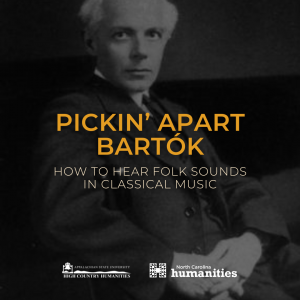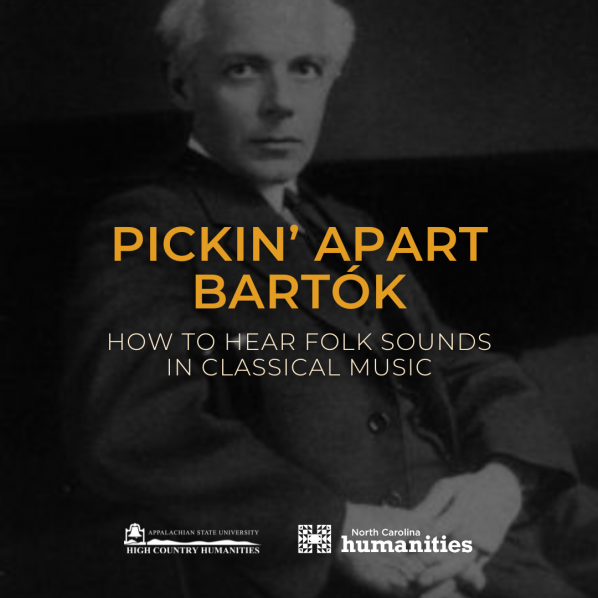“Pickin’ Apart Bartók: How to Hear Folk Sounds in Classical Music”
Wednesday, April 2, 2025, from 5:30-7 p.m.
Jones House Cultural Center (604 West King Street, Boone, NC, 28607)
[Add to Google Calendar] [View on Engage]
BOONE, N.C. — Appalachian State University's High Country Humanities—with support from North Carolina Humanities—is pleased to present “Pickin’ Apart Bartók: How to Hear Folk Sounds in Classical Music” on Wednesday, April 2, 2025, from 5:30-7 p.m. at the Jones House Cultural Center, located at 604 West King Street in Boone.
The classical composer Béla Bartók is perhaps most famous in the music world for having incorporated elements of folk music into his work, a practice that earned him the title of “father of ethnomusicology.” He even spent one summer in Asheville in 1945 and composed one of his piano concertos there.
What qualifies as folk music in North Carolina and around the world? What elements of rural sound inspired Bartók, and in which rural communities did they originate? In this workshop, participants will hear examples of and learn to recognize the folk sounds in classical music.
This event is intended for general audiences, and no prior knowledge of music is necessary to participate.
“Pickin’ Apart Bartók: How to Hear Folk Sounds in Classical Music” will feature presentations by the following guest speakers:
Mr. Mark Freed
Mr. Mark Freed (he/him) is an adjunct instructor in App State's Hayes School of Music and the Director of Cultural Resources for the Town of Boone. He holds an M.A. in Appalachian studies from App State, an M.L.S. from Clarion University and a B.A. in journalism from Indiana University. His publications include “Doc Watson: North Carolina Legend” (Tar Heel Junior Historian, 2009) and “Give Me that Old-Time Music and Dancin’” (High Country Magazine, 2007), and he co-edited Appalachian Journal’s special issue on Appalachian Music, alongside Mr. Trevor McKenzie and Dr. Sandra Ballard. Freed serves on the board of Junior Appalachian Musicians, Inc., a regional organization that helps develop and promote community programs that provide instruction in traditional southern Appalachian music. He oversees the Watauga Arts Council’s Concerts on the Lawn series and hosts weekly acoustic jam sessions at the Jones House Cultural Center in downtown Boone. He plays banjo, piano, guitar and mandolin.
Dr. Jacob Kopcienski
Dr. Jacob Kopcienski (he/they) is an assistant professor of musicology in App State's Hayes School of Music, as well as an affiliate of the Center for Appalachian Studies. He holds a Ph.D. in musicology from Ohio State University and an M.A. from West Virginia University. His research contextualizes LGBTQ music, cultural organizing and communities in Appalachia, the Midwest and the South. Dr. Kopcienski has published in the Journal of the Society for American Music, the Journal of Appalachian Studies and as a staff writer for the website I Care if You Listen. He leads community-engaged work at App State as the coordinator of the Music Humanities Community Conversation Series. Previously, he worked with the Ohio State Center for Folklore Studies, the Rendville Historic Preservation Society and Black in Appalachia in a multi-year partnership to document rural African American communities in Appalachian Ohio. He also holds a B.M. from Bowling Green State University and completed studies in saxophone at the Conservatoire à Rayonnement Régional de Boulogne-Billancourt in France.
Mr. Trevor McKenzie
Mr. Trevor McKenzie (he/him) is Director of App State's Center for Appalachian Studies. He is the author of Otto Wood, the Bandit: The Freighthopping Thief, Bootlegger, and Convicted Murderer behind the Appalachian Ballads (UNC Press, 2021). He holds an M.A. in Appalachian studies and a B.S. in applied and public history from App State, as well as an M.L.I.S. from the University of North Carolina at Greensboro. In the community, McKenzie works with the Junior Appalachian Musicians, the Blue Ridge National Heritage Area, the Blue Ridge Hall of Fame, Boone Area Community Radio and the Ashe County Arts Council. He is also the vice president of the North Carolina Folklore Society and a member of West Virginia Public Broadcasting’s “Inside Appalachia” Folkways Reporting Corps, which documents stories about regional music traditions. McKenzie plays banjo and received an In These Mountains Apprenticeship to study fiddle traditions of the Virginia-North Carolina border with master fiddler Paul Brown.
This event is the second in a three-part series titled, “Bridging the Divide between Classical Music and Folk Traditions: Béla Bartók’s Legacy,” organized by High Country Humanities with the support of a grant from North Carolina Humanities. The event is free and open to the public.
For more information, visit hchumanities.appstate.edu or contact Dr. Darci Gardner, director of High Country Humanities, by email at gardnerdl1@appstate.edu or by phone at (828) 262-2928.
Related:
March 4: Bartók: From Opposing Ethnic Cleansing to Inventing Ethnomusicology
May 4: Folk-Infused Classical Music: Listening Workshop and Concert
###
About High Country Humanities
High Country Humanities at Appalachian State University aims to foster a greater understanding and appreciation of the humanities across the High Country region of North Carolina. The program supports faculty in their scholarly activities, promotes their collaborations with community partners and organizes events that help their expertise reach the wider public. High Country Humanities is an initiative of App State’s College of Arts and Sciences, with support from the Division of Academic Affairs. Learn more at hchumanities.appstate.edu.

